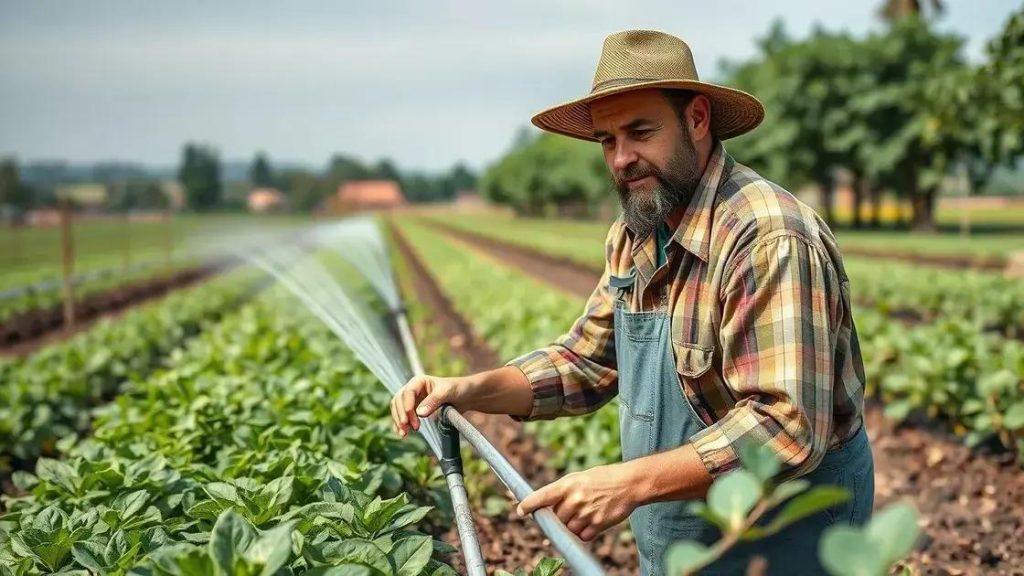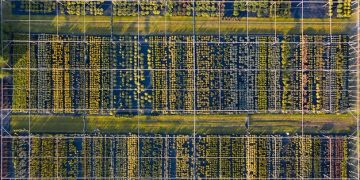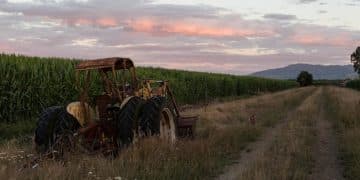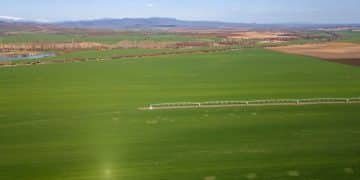Water conservation methods in farming: tips for success

Water conservation methods in farming enhance sustainability, increase crop yields, reduce costs, and protect the environment while addressing challenges like scarcity and the need for advanced technologies.
Water conservation methods in farming play a crucial role in ensuring sustainable agricultural practices. Have you ever wondered how farmers manage to grow crops during droughts? Let’s dive into effective strategies that can make a difference.
Understanding the importance of water conservation in farming
Water is an essential resource for farming and understanding its conservation is key for sustainable agriculture. By using effective water conservation methods, farmers can enhance productivity while protecting natural resources. Farmers are faced with challenges like climate change and water scarcity; hence, implementing these methods is crucial.
The significance of conserving water in agriculture
Conserving water not only helps farmers but also benefits the environment. Efficient usage reduces the strain on local water supplies and ensures that crops receive adequate moisture. There are various techniques that can be utilized to achieve this.
- Improving irrigation systems to minimize waste.
- Utilizing rainwater harvesting for irrigation.
- Planting drought-resistant crops.
- Implementing soil moisture management practices.
These methods make agriculture more resilient against droughts. Moreover, they contribute to better soil health, which is essential for long-term productivity.
Economic Benefits
Investing in water conservation methods can lead to significant savings for farmers. Lower water bills and improved crop yields can enhance a farm’s profitability. When farmers adopt efficient practices, they often find that they can sustain their operations more effectively.
Furthermore, conserving water can lead to increased public support and funding for agricultural initiatives, as it aligns with broader environmental goals. As more farmers recognize these benefits, the adoption of sustainable practices continues to grow.
Innovative techniques for saving water

Innovative techniques for saving water in agriculture are becoming essential as we face increasing environmental challenges. Farmers are adopting new strategies that not only conserve water but also enhance crop productivity. These cutting-edge methods play a vital role in sustainable farming and can lead to significant improvements in water efficiency.
Precision irrigation systems
One effective approach is the use of precision irrigation systems, which apply water directly to the plant roots. This method minimizes water loss and ensures that crops receive the exact amount of moisture they need. By using technology such as sensors and data analysis, farmers can optimize their irrigation schedules and reduce waste.
- Automated scheduling based on weather data enhances efficiency.
- Soil moisture sensors help determine when to irrigate.
- Drip irrigation systems deliver water at roots, reducing evaporation.
- Monitoring and control systems allow real-time adjustments.
Another method that has gained popularity is capturing and utilizing rainwater. Implementing rainwater harvesting systems enables farmers to store excess rainfall and use it during drier months. This approach not only saves water but also reduces dependence on groundwater.
Cover cropping and mulching
Cover cropping is yet another innovative technique. By planting cover crops during off-seasons, farmers can improve soil structure and moisture retention. Cover crops, such as clover or rye, protect the soil from erosion and enhance its ability to hold water. Similarly, applying mulch around plants helps reduce evaporation and maintain soil moisture levels.
These practices contribute to healthier crops while conserving water resources. With the integration of these innovative techniques, the agricultural sector can make significant strides toward sustainability, ensuring that water remains available for future generations.
Benefits of implementing water conservation methods
Implementing water conservation methods brings numerous benefits to farmers, the environment, and the community. By adopting these practices, farmers can ensure a sustainable future while boosting their productivity. Not only do these methods help secure water supplies, but they also promote healthy ecosystems.
Increased crop yields
One of the primary benefits is increased crop yields. When farmers efficiently manage water usage, crops receive the right amount of moisture, fostering better growth and stronger plants. This leads to higher quality produce and can significantly increase a farm’s profitability.
- Efficient watering schedules support optimal plant health.
- Healthy soil retains moisture better, enhancing nutrient availability.
- Targeted irrigation reduces plant stress during dry periods.
- Innovative methods lead to fewer crop failures due to drought.
An added advantage of these methods is cost savings. By reducing water waste, farmers lower their water bills, which can free up funds for other essential farming needs. This financial relief makes it easier to invest in additional resources or technologies.
Environmental protection
Water conservation methods also play a critical role in protecting the environment. By conserving water, farmers reduce the risk of depleting local water sources. This, in turn, helps preserve wildlife habitats and supports biodiversity. Sustainable farming practices contribute to the health of surrounding ecosystems.
Moreover, conserving water helps prevent soil erosion. Healthy soil retains nutrients better and supports diverse plant life, promoting a balanced ecosystem on and off the farm. Adopting water-saving practices not only benefits individual farms but also contributes to community resilience against climate change.
Challenges and solutions in water conservation for agriculture

Challenges in water conservation for agriculture can affect productivity and sustainability. Farmers face several obstacles when trying to implement effective water conservation methods. Understanding these challenges helps in finding suitable solutions to ensure a more sustainable future.
Water scarcity and quality issues
One significant challenge is the limited availability of water in certain regions. Many farmers are struggling with water scarcity, due to changing climate patterns and over-extraction of groundwater. Additionally, water quality can be an issue if sources are contaminated or affected by runoff. This can impact crop health and yield.
- Implementing efficient irrigation techniques can address scarcity.
- Testing and filtering water sources ensures better quality.
- Using technology to monitor water levels can improve management.
- Collaboration with local agencies can help access cleaner water.
Another challenge farmers encounter is the initial investment needed for advanced water conservation technologies. Many sustainable methods require upfront costs that might deter some from adopting them. However, the long-term savings can outweigh these initial expenses.
Education and training
Lack of education on modern conservation techniques is another barrier. Many farmers may not be aware of the benefits of water-saving practices or how to implement them. Providing training and resources can be essential. Community workshops and online resources can help improve knowledge and skills.
Furthermore, establishing a support network among farmers can facilitate the sharing of experiences and effective practices, fostering a community committed to sustainability. By tackling these challenges head-on, farmers can not only conserve water but also create a more resilient agricultural system.
In conclusion, implementing water conservation methods in farming is crucial for sustaining agriculture and protecting our natural resources. By overcoming challenges and adopting innovative solutions, farmers can increase crop yields, save money, and promote environmental health. Education and community support play a significant role in spreading awareness about these practices. As we continue to prioritize water conservation, we can ensure that future generations have access to the resources they need for successful farming. Together, we can cultivate a more sustainable future.
FAQ – Frequently Asked Questions about Water Conservation in Farming
What are the main benefits of water conservation methods in farming?
The main benefits include increased crop yields, cost savings on water bills, and better environmental protection.
What challenges do farmers face in implementing water conservation techniques?
Farmers often face obstacles like water scarcity, high initial costs for technology, and lack of education on best practices.
How can education help farmers adopt water-saving practices?
Education can provide farmers with the necessary knowledge and skills to implement effective water conservation methods, improving overall efficiency.
What innovative techniques can be used to save water in agriculture?
Techniques like precision irrigation, rainwater harvesting, and mulching can significantly enhance water conservation in farming.





